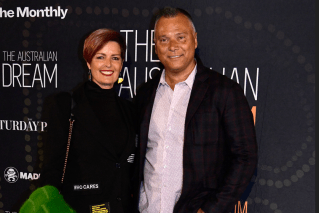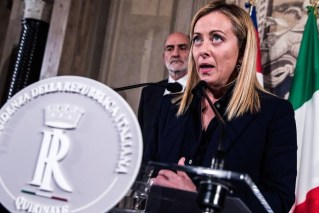Need forgiveness? This is the kind of smile you need to get things started


At least he's smiling, but does that mean you can trust him? Photo: Getty
We’ve all been there: in a group situation that demands cooperation from all those present.
You’re pushing a car out of the mud, about to jump from behind the furniture and yell “Surprise!”, or even caught up in one of those damned trust exercises at work – when some smart-aleck pot-stirrer engages in sabotage, just for a laugh.
Then he tries to smile his way back into the circle of trust.
Does he get away with it? Can he be forgiven his betrayal? Apparently, yes.
According to a new smile study, a “certain type of smile can help to restore trust in relationships after someone has been uncooperative or untrustworthy”.
Smile research means grinning and bearing it
Da Vinci’s Mona Lisa is famous for her a simple mystery – what the hell is she smiling about? Or putting it another way: what does the smile mean?
This question underpins the field of smile research, a niche line of psychological enquiry.
Back in 1924, Carney Landis, a psychology student at the University of Minnesota, concluded there were 19 different types of smile, and most of them expressed misery, fear and horror. Only six were associated with happiness or pleasure.
There’s a good reason for that: Landis photographed his participants continuously over a three-hour period.
Along with listening to jazz and reading the Bible, the participants were exposed to pornography, made to decapitate live rats, suffered the surprise of fireworks exploding under their seats and almost being electrocuted while feeling around around in a bucket of frogs.
Things have settled down since then
In a 2017 paper, Dr Magdalena Rychlowska, a psychologist then at Cardiff University, investigated three kinds of smile in a paper titled ‘Functional Smiles: Tools for Love, Sympathy, and War’.
These were:
- Reward smiles that communicate positive emotions, such as enjoyment and pleasure.
- Affiliation smiles which are predicted to convey prosocial motives such as friendliness, embarrassment and nonverbal apologies, and build social bonds.
- Dominance smiles, which are a kind of smirk that signal one’s superiority and should elicit negative feelings in the observer.

Reward, affiliative, and dominance smiles. Images: M. Rychlowska
In her latest study, Dr Rychlowska, now a lecturer at Queen’s University i Belfast, has been analysing how these three types of smiles “can influence social judgments and trust in difficult situations where there could be conflict”.
No electric shocks or headless rats
Dr Rychlowska didn’t give electric shocks to her study participants – but she did create an uncomfortable scenario for more than 900 participants involved in five experiments.
In the experiment, a group of participants played an economic trust game where cooperation guarantees a certain amount of money for all players.
It’s a version of what’s known as the prisoner’s dilemma and roughly worked like this: Players have the option of betraying the group and trying to steal the whole jackpot. But if they all make a play for the jackpot, they’re all left empty handed.
In the experiment, a spoiler (acting as a representative of a second group) sat in on the game – and proceeded to act uncooperatively, unfairly and treat the group badly.
The spoiler then flashed a smile – or made a neutral or regretful expression.
The participants then reported “how they felt about this person and how they would interact with them in terms of sharing their resources,” Dr Rychlowska explained.
The liar’s grin
“We found that when a person smiled after being uncooperative or untrustworthy, they were viewed as being happy and, therefore, they appeared untrustworthy and unwilling to change their behaviour.”
This was the case when the spoiler flashed a reward (pleased with the outcome) or dominance (up yours) smile.
However, when an affiliation smile was used, “this was perceived as an attempt to make amends, restoring higher levels of trust than the other two smiles”.
Dr Rychlowska said the way that someone smiles at you “can change the meaning of a situation – for the good or the bad. We react differently to different types of smiles and situations in which these smiles are shown”.
She gave as an example, the villains in a James Bond movie. “They often make happy smiles when something bad has happened or is about to happen. This context makes these otherwise happy and normal smiles feel threatening and unpleasant.”
She said the study demonstrated “the power of subtle facial expressions and the positive consequences that an affiliation smile can have in difficult situations”.
In other words, affiliation is the smile to fake when making amends. Here it is:








